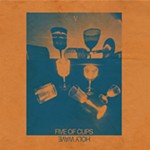Blondie
Reissue
Reviewed by Margaret Moser, Fri., Oct. 12, 2001

Blondie
(Capitol/Chrysalis)Blondie
Plastic Letters (Capitol/Chrysalis)Blondie
Parallel Lines (Capitol/Chrysalis)Blondie
Eat to the Beat (Capitol/Chrysalis)Blondie
Auto American (Capitol/Chrysalis)Blondie
The Hunter (Capitol/Chrysalis)When Blondie burst onto the scene in 1976, New Wave was almost exclusively a New York phenomenon, leeched from its punk roots in England and stripped of politics. That freedom from meaning gave great weight to zero-concept bands like the Ramones and anti-concept bands like Talking Heads, but it didn't sell the sound to Middle America. Blondie sold New Wave to America and they did it for one simple reason: Debbie Harry. Nothing sells like sex, and it was apparent from the first that while "Blondie is a band," the lithe, diminutive former Playboy Bunny with duotone hair was its main attraction. Under Richard Goetherer's production, Blondie's self-titled debut emerged with a fairly standard garage pop format of catchy tunes that added Harry's distinctive chant-and-soar style for effect ("X Offender," "Rip Her to Shreds," "Little Girl Lies"). Plastic Letters, their hyper-pop sophomore effort, further cross-bred radio rock and tabloid titles ("Youth Nabbed as Sniper," "Contact in Red Square") with an obscure Sixties cover ("Denis"), and a heartfelt ballad, "(I'm Always Touched By Your) Presence, Dear." Album three, the irresistibly danceable Parallel Lines, was a giant step for the group and their first platinum album, featuring producer/svengali Mike Chapman at the helm. With Nigel Harrison and Jimmy Destri joining Chris Stein, Clem Burke, and Frank Infante, Harry's voice was full-bodied and slid from sneer to sob in one measure with chart-grabbers like "One Way or Another," "Hangin' On the Telephone," "Sunday Girl," and an unexpected hit in a disco-mixed "Heart of Glass." Eat to the Beat continued that lush sound and veered more into dance again with "Dreaming" and "Atomic" (featuring backing vocals by Ellie Greenwich), but Blondie's biggest moment occurred when the non-album single "Call Me" went No. 1 in the U.S. and U.K. in 1980. The following year, Auto American went platinum as well with "Tide Is High," and yielded rap's first platinum single, "Rapture," but the album was an uneven offering, reflecting Blondie's splintering goals; Harry released her first solo album that year. The Hunter was Blondie's final album of their youth, veering heavy into more dance ("Warchild") and nascent electronica ("Dragonfly"). It peaked at No. 33, and when the tour stiffed, Blondie broke up. Notable live and demo bonuses throughout these reissues include "Bang a Gong," "Platinum Blonde," David Bowie's "Heroes," and Johnny Cash's "Ring of Fire," until now only available on the Roadie soundtrack (the band shot their performance in Austin). Enjoy a pogo down memory lane sans the pop and skip of vinyl -- Blondie is still hot stuff.
(Blondie) ![]()
![]()
(Plastic Letters) ![]()
![]()
![]()
(Parallel Lines) ![]()
![]()
![]()
![]()
(Eat to the Beat) ![]()
![]()
![]()
(Auto American) ![]()
![]()
![]()
(The Hunter) ![]()
![]()










